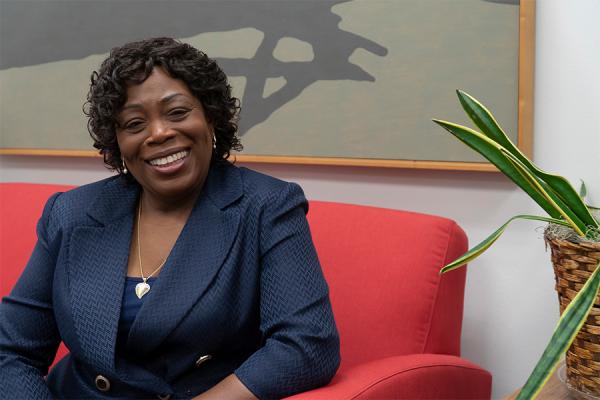Newtona (Tina) Johnson, the new associate provost for faculty and diversity affairs at the University of New Orleans, rose through the ranks of academia holding various faculty and administrative leadership positions that she feels has well-prepared her to assist faculty in being successful.
“You know what faculty is going through because you have gone through it yourself,” Johnson said. “You know what the struggles are and what you need to do to recalibrate to make sure that what you do, you do well.
“It’s invaluable experience, especially for this position, when you’re working with faculty.”
Johnson comes to UNO from the 21,000-student Middle Tennessee State University where she was a professor of English and previously served as interim vice provost for academic affairs and chief diversity officer, and director of women’s studies/women’s and gender studies. She spent eight years at Spelman College in Atlanta prior to her time at Middle Tennessee State.
“I was drawn to UNO's commitment to provide educational excellence to a diverse undergraduate and graduate student body, and its vision of being one of the preeminent urban research institutions in the nation noted for its commitment to excellence in teaching and in student success,” Johnson said.
Johnson holds a doctorate in literary and cultural studies from Emory University, a master’s in applied linguistics from Concordia University in Montreal, a master’s in English from Dalhousie University in Halifax, Nova Scotia and a bachelor’s degree in English language and literature from the University of Sierra Leone.
She also has extensive training in senior-level higher education management and leadership, including a yearlong American Council on Education Fellows Program and the Harvard Institute for Management and Leadership in Education.
“To me, faculty success and student success are intertwined,” Johnson said. “If you want your students to be successful, your faculty have to be successful as well. How do we aid them? By facilitating professional and personal growth.”
Johnson, who arrived on campus in July, describes her leadership approach as providing a “scaffold” of supportive services such as training, supporting a comprehensive professional development program, mentoring or facilitating grant activities because faculty should be viewed holistically.
She instituted tenure and promotion workshops and initiated faculty mentoring programs for specific affinity groups, such as women associate professors, while at Middle Tennessee State.
“When we talk about success, it’s not just success professionally, it’s also about personal growth,” Johnson said. “For me, faculty success is enabling professional and personal growth. Then faculty are engaged and they have that sense of being committed to the institution, because the institution is committed to them."
Johnson said she views her role as a facilitator—somebody who motivates and provides support for others to do well in whatever position that they serve.
“My management approach is that I’m there to help, to motivate,” she said. “Everybody can succeed with the right circumstances, the right help. That’s what I love to do.”
Johnson says her dual roles will allow her to work with faculty to ensure they are as well-equipped and comfortable to be best they can be in the classroom and to oversee the University’s commitment to diversity and inclusion.
“So, I have two hats,” Johnson said. “Faculty affairs is essentially to work with faculty to ensure their success in different ways … the other is diversity, and that is to ensure that this institution’s commitment to diversity and inclusion is pursued. To make sure that we can retain our students and faculty by making sure they feel that they belong here.”
As the chief diversity officer at Middle Tennessee, Johnson provided administrative personnel support to the University’s 18-member diversity advisory board and was the liaison with the state board of regents on diversity-related matters.
Johnson, who said she has studied the city of New Orleans from afar as part of her cultural research on diaspora and hybridity, said she is excited about living here and getting to know the UNO community.
“It’s just a wonderful opportunity to be where I can contribute to moving the institution forward,” Johnson said. “I am committed to the institution’s mission and to President Nicklow’s transformative vision.”





